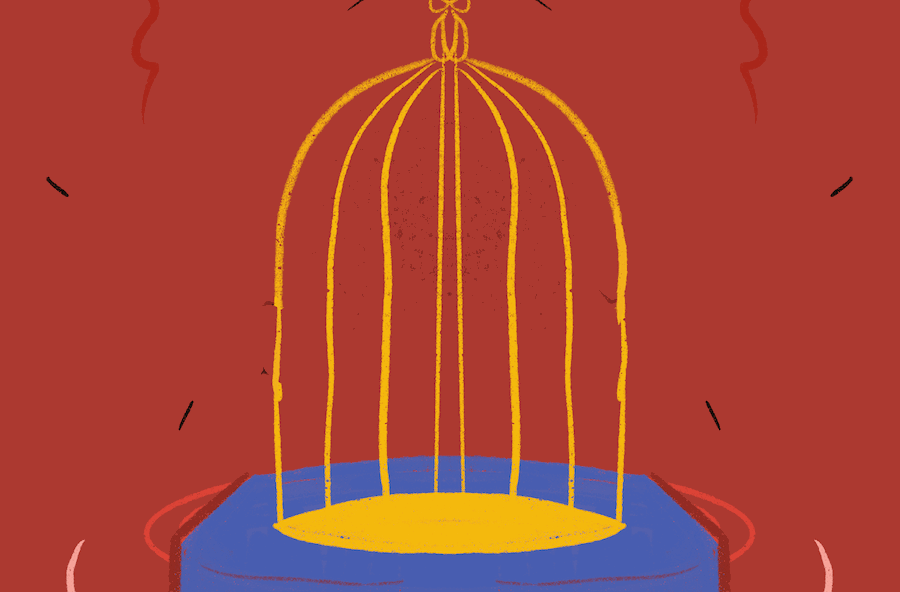Two women write about imprisonment, one from the outside and one from the inside.

February 20, 2020
[Editor’s Note: Sarah Wang was an AAWW Witness Program Fellow in 2019, alongside Christina Olivares, Roshan Abraham, and CM Campbell. As part of the program, each fellow was paired with an incarcerated writer with whom they exchanged letters. You can read more about Sarah’s correspondence with Connie Leung, a Chinese American poet incarcerated at Bedford Hills Correctional Facility, in an interview published on PEN America.]
In May of last year, I began exchanging letters with Connie Leung, a poet who is incarcerated at Bedford Hills Correctional Facility. I had already read her writing and was struck by its clarity, its instinct for a kind of emotion that is at once bare and restrained. We quickly developed a closeness based on our shared interests, background, and life experiences. The majority of our dialogue skips from one of these subjects to another and back again, always returning to a baseline of where we come from and the events that have affected and continue to affect us. When Connie describes her childhood in East Harlem, where I now live, I describe what the neighborhood looks like now. We debate shifting portrayals of Asians in popular culture. We discuss the books we’re reading, our favorite writers, our jobs, our fields of study, relationships and love, and the prejudice of a carceral system that punishes girls and women differently than boys and men. Perhaps most of all, our letters are cast through the die of lived experience: what it is like to be a woman subject to gendered violence in this world.
Although Connie is incarcerated, our conversations do not differ greatly from those I have with my other friends. Recently, I asked her whether I could publish two of our letters, and she said yes. They have been lightly edited for clarity.
—Sarah Wang
Dear Connie,
We don’t know each other well, but we’ve each read the other’s writing, and so we do know something about the other that is conveyed through language. My mother told me that my father wooed her with letters from Taiwan after she had already moved to California. She fell for him through the transmission of language, a thing with infinite power and strength.
Where did you live in East Harlem? What do you want to know about the neighborhood? I will be happy to be your eyes. I can tell you that there are a lot of taco stands, taco trucks, fresh fruit juice vendors on the street, and a lady who sells yogurt out of a red plastic cooler on the corner. There is a soccer shop across the street that sells memorabilia, uniforms, and of course soccer balls. There is a cuchifritos (Puerto Rican fried pork) place, a bakery downstairs that wafts smells of butter and yeast up into my apartment in the early hours of dawn, a beauty supply with a good selection of wigs down the block. When my mother visited me last summer, we got haircuts in Chinatown together. The hairdresser cut my mother’s hair too short and she thought it made her look old, so she said she wanted to buy a wig. I indulged her and took her to this wig shop. She tried one on and frowned at her reflection in the mirror. “It’s not the hair that makes me look old, it’s my face,” she said, and put the wig back on the Styrofoam head.
I’m reading a book right now on trauma and the body. It’s about how trauma becomes lodged in your body, and how it can immobilize you. The writer, Peter Levine, studied animal behavior in relationship to trauma, and says that when one animal chases another, sometimes the prey will suddenly freeze and collapse. If the predator doesn’t kill its prey, the latter will get up, shake itself off, and continue running to safety. Humans, Levine says, fare better in the aftermath of trauma, if they can (figuratively) also shake themselves off and help themselves get away and past the traumatic event. If they cannot, as in most cases of sustained childhood trauma and a lot of abusive situations, people will dissociate in order to survive. What the trauma imprints on the body, essentially, is a state of inertia where the body is still holding on to and living in the traumatic event. I have only read 50 pages of the book, but so far he proposes a method called Somatic Experiencing to help people reverse the dissociation and occupy their bodies again, to become more aware of physiological sensations, and to regain some agency. Because the prey is able to get up, express its fear through its body by shaking off, and then in being able to help itself by continuing to run away from the predator that is trying to kill it, the animal feels a sense of capability. The fact that it collapsed in the chase is only natural: a body’s overwhelmed response to facing death.
Freud said, Wo Es war, soll Ich werden, which means something like “where it was, so shall I be.” There are a lot of interpretations of this quote, but I think it means that there is no progressing or regressing; there is only a continuous loop that repeats itself over and over. We do not have a destination; we only return to the past, an infinite reprisal until our annihilation in death. This isn’t all to say that we are doomed, but that we have a compulsion for repetition that brings us back, no matter how far we get (we cannot get far), to where we once were. There is a study I read on two groups of rats, one of which was raised in a comfortable, safe environment and the other of which was raised in a loud, uncomfortable, and unsafe environment. When they were let out of their ‘homes,’ if there was a sharp noise that startled the rats, both groups would rush back to where they were raised, even if those places were unsafe. This sense of belonging is an innate homing system. We go back to where we feel a sense of familiarity, even if that familiarity is a bad familiarity. If our brains are continually processing sustained traumatic experiences, that high level of alert and fear of impending danger becomes familiar, becomes our normal operating standard. When we are not in those environments, that is abnormal. So there is an inversion going on. People who are traumatized are in a sense more comfortable in traumatic environments, because that is what we are used to. And perhaps that is why we continue to seek out experiences and people who are harmful to us. Because it is home. It is where we belong.
I am going to send you a couple books this week. I’m staying in Los Angeles for a couple weeks with a friend, who’s an editor at an independent press. I’m told we can send you books directly from publishers. One is a nonfiction book by Jackie Wang, Carceral Capitalism. The title tells you what it’s about. Her brother is incarcerated, and Jackie is also a poet. She says that there is a knot at the center of her life—which is her experience of having a brother who was incarcerated as a juvenile and who is serving a life sentence, and being subject to the effects of the carceral system in her capacity as a family member of an incarcerated person—and so much of her language is really beautiful, incredibly powerful, and angry. There’s also poetry incorporated into the book, alongside the nonfiction. The book is one of my favorites, expansive and incisive in the way that only lived experience can generate, and embodied.
The other book is Andrea Dworkin’s Last Days at Hot Slit. She was a radical second-wave feminist who wrote about rape and abuse at the hands of her ex-husband, as well as about battered women and domestic violence in general. There’s an essay on Nicole Brown Simpson and on anti-pornography, on woman-hating and her life as a writer. It’s an anthology of collected writings from the ’70s to the ’90s, mostly, so you’ll see how some of it is just as relevant now as it was four decades ago, and perhaps how some of it can be read historically. In December of last year, I was in Los Angeles, I stayed with my friend, the editor I mentioned earlier, and he gave me an advance reading copy of Dworkin’s book. He said, “I feel like we’re publishing this book for a reason.” I stayed in his guest room over the holidays, and the new year, and read Last Days. It is a very important book to me, the first I’d read about battered women and domestic violence. One particular passage struck me, has stayed with me, has become imprinted within me.
“And then, there is the fact that, during those weeks that stretch into years when one is a battered wife, one’s mind is shattered slowly over time, splintered into a thousand pieces. The mind is slowly submerged in chaos and despair, buried broken and barely alive in an impenetrable tomb of isolation. This isolation is so absolute, so killing, so morbid, so malignant and devouring that there is nothing in one’s life but it, it. One is entirely shrouded in a loneliness that no earthquake could move. Men have asked over the centuries a question that, in their hands, ironically becomes abstract: ‘What is reality?’ They have written complicated volumes on this question. The woman who was a battered wife and has escaped knows the answer: reality is when something is happening to you and you know it and can say it and when you say it other people understand what you mean and believe you. That is reality, and the battered wife, imprisoned alone in a nightmare that is happening to her, has lost it and cannot find it anywhere.”
—Andrea Dworkin
What Dworkin identifies as a loss of reality locates abuse as not only acts of violence but a totalizing existence. Where can a person live but in chaos, despair, in an impenetrable tomb of isolation when she cannot find reality? I still cry whenever I read this passage. Sometimes being a woman feels like slow genocide.
You asked me if we are “the carriers of [our family’s] legacies of sorrow… forever searching the sea of tears that carried our parents… their dreams… our reflections.” I don’t know either, Connie. Our families came to the US in search of something that I fear I will never find. I think of Beckett: You must go on. I can’t go on. I’ll go on. I occupy all of these positions at once. I must, I can’t, but I will. And so will you.
Yours,
Sarah
Dear Sarah
May you be safe and well.
Your letter came today and your words were, as they say, “perfect timing.” I had a legal visit earlier in the day that rattled my nerves a bit. (I’ll discuss it later.) As I was finally unwinding, I was called for your mail and it was just nice to remember that I’m not “alone.”
Thank you for the many “congrats” on my graduation/degree. Honestly… I feel nothing although I really want to. I walked/graduated with two honor cards—representing two different honors societies I was inducted into—while my senior thesis won two awards. Perhaps being in prison so long has taken the context out from me because while I am thoroughly aware of how important education is, it’s still all just a theory to me. I have yet to see its full power in practice, I guess. Or maybe it’s the self-deprecating habit I’ve developed. In any case, I am happy… I am grateful… and I’m just ready to do so much more.
I had no choice in a major. Sociology is/was the only major offered. Psychology was my choice—the other minor is business. It’s fine though. I enjoyed the major regardless and was glad it wasn’t left up to me to decide. I was too young and lost to make any real decisions back then. I cannot pursue a Master’s or PhD through the college program but I’m allowed to venture out into independent studies.
My thesis’ main goal was to examine how New York came to favor the foster care system over other systems of child welfare. I provide a brief timeline of that evolution and then, the paper transitions into the problem with children who age out of foster care. The end is my proposal for a nonprofit/alternative institution that focuses on assisting homeless and aged-out youth.
An academic conference is held here, sponsored by my college. It’s a big event. The prison shuts down the entire school building for about five hours. Students and professors from the outside come in and we share ideas, discussions, etc. It’s fun.
The manuscript was a fun project to me. You are the second person and veteran writer to tell me people struggle to complete manuscripts (and so, I’m taking your word for it). I submitted to Gaudy Boy. (I found out AAWW hosted their first book launches—I think in 2017. Small world.) I don’t think I’ll win but it was a great experience… one that’s left me with a complete “book” of my poetry for safekeeping. I guess it’s about my life story/experiences up to this point. There’s a poem about South Street Seaport in it titled “Pier 17.” It was a safe haven for me.
And I encourage you to trust your voice. It’s not about how well received it may or may not be. It’s about claiming that we do have a voice… and that no matter how hard people tried to stomp it out of us, we are still “here.”
I’m going to close out here. I look forward to your letters. Take care. Breathe. And be well.
With love,
Connie



